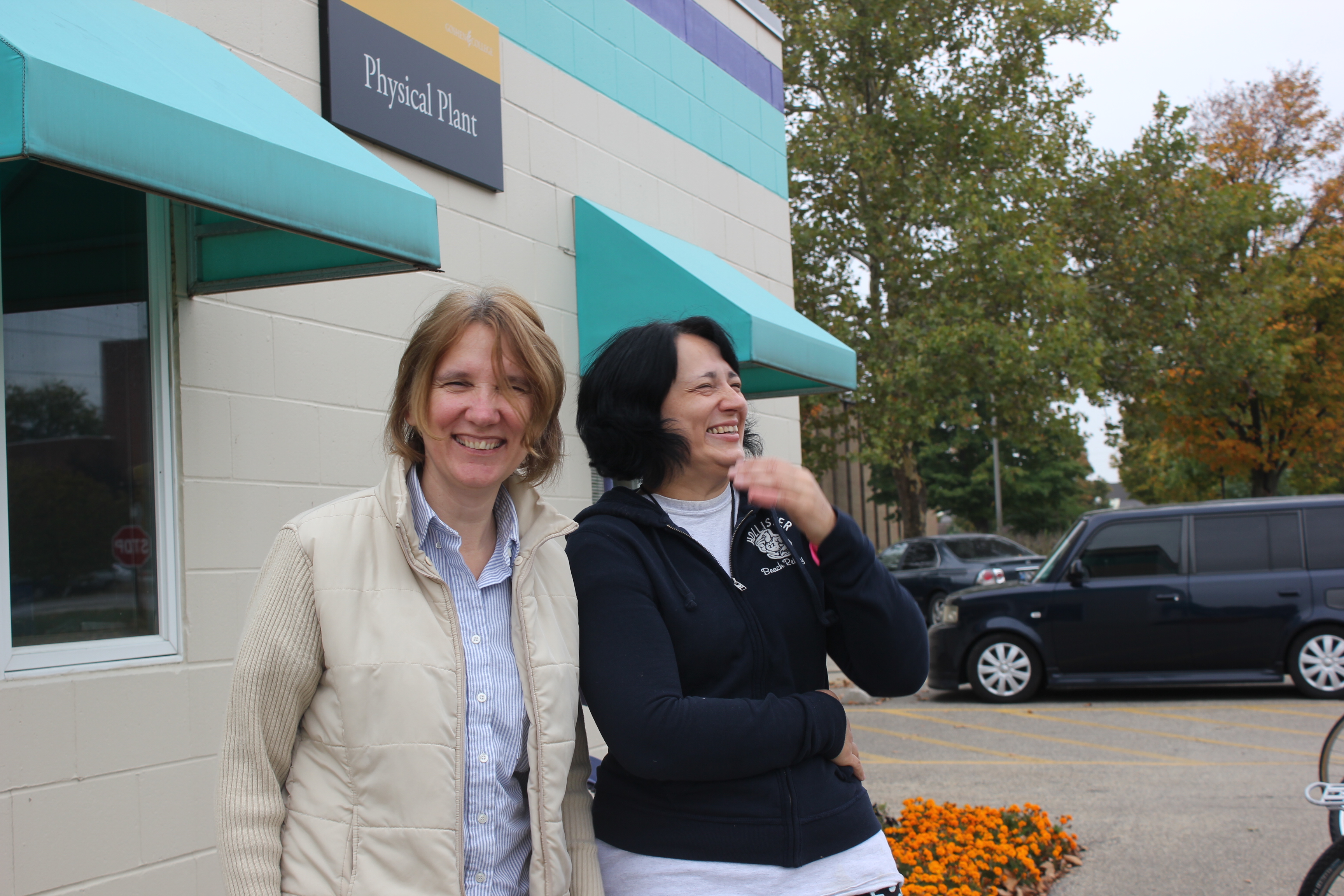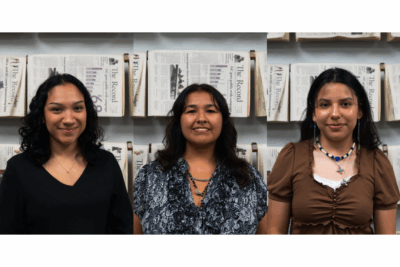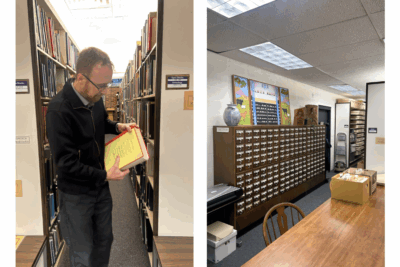Russian chatter spills from the worker’s lounge in the Goshen College Physical Plant. Four custodians from Ukraine gather at the day’s 6 a.m. start, waiting for their cleaning crews and relaxing in the ease of their mother tongue. Here they can take a break from the effort of communicating in English.
For most students at the college, Study-Service Term is the longest time they will be completely immersed in a new language, but others on campus grapple daily with the twists and turns of the English language.Valentyna Naumchuk’s face relaxes when she talks in Russian with Svitlana Meyta and other custodians from Ukraine. Naumchuck studied English during college in Ukraine, but it was overwhelming for her to arrive two years ago in America and have to put all that abstract grammar into practice.
“I’m afraid of making mistakes,” Naumchuck said, slowly and shyly, saying she couldn’t speak English, even as she said so in English.
Perhaps the language will eventually come easier to Naumchuck, as it has for her colleague Meyta. Seven years ago, Meyta was a new arrival in the U.S. Surrounded by a language of which she knew nothing, Meyta could hardly shop at the grocery store. She didn’t have a translator. She had to practice speaking English on her own.
After two years of intensive study in Spokane, Wash., Meyta moved to Goshen for her husband’s work and was hired at Goshen College. Now she sometimes stops washing windows to talk to students in gently accented but very understandable English. Meyta says she learned English because she was forced to, and that was the fastest way to learn.
Rather than rely on a translator, Rocio Diaz, who works at Goshen College’s Center for Intercultural Teaching and Learning, agrees that it is faster to learn English without the crutch provided by translation. She says you “just have to jump in the pool and learn to swim.”
When Diaz arrived in Goshen, she was a Spanish-speaking swimmer in the middle of an ocean of English. Although she said you just have to “jump in,” this it is not an easy task to undertake. There were times when she would read a sentence over and over and just not grasp the meaning.
“It gets complicated and it gets tiring,” Diaz said. “[You get] tired of forcing yourself.”
Sometimes she would just stand there trying to put together all the foreign words, nodding her head even though she was clueless.
But Diaz likes knowing two languages. Today Diaz can let the English flow out with the ease of a second language and no longer has so much to learn. That doesn’t mean there are never new words to surprise her. Just recently, a friend told her he was going for a stroll.
“A stroll?” she said. “What’s a stroll?” Now she’s celebrating her new vocabulary.
It’s not just vocabulary that makes an English learner think. Phrases coming from a mysterious cultural context, like “it’s raining cats and dogs,” are not logical to someone trying to decipher individual words.
Compared to Diaz’s first language, Spanish, in which each vowel has only one sound, multiple-sound English vowels are just one more cause for confusion.
Diaz said few students come to Goshen College without a solid background in English. There is a gap to be bridged, however, between classroom language exposure and 24-hour daily exercise in speaking English.
Adama Millogo, a junior majoring in ESL, studied English throughout middle and high school in Burkina Faso, but that, he says, was “just in an academic setting, and after school, no more English.”
His arrival in the U.S. was overload for Millogo.
“I had never spent one hour just listening to English, never before,” Millogo said. His brain felt like “an oversized, throbbing head.”
“I could pick one word,” Millogo said. “But I thought of that word, and by the time I understood that word, it was like five sentences [gone].”
Millogo came to Goshen College from Burkina Faso as a recipient of a Fulbright scholarship, speaking fluent, even eloquent English. His arrival in America was anything but fluent, however.
“Before I even came, I had a struggle at the airport,” Millogo said. “I got lost, and when I asked for direction, ‘Blahblahblah.’ Wow! I was like ‘Woah, woah.’ That lady speaks, she has a nice voice, but… I was embarrassed to ask for the third time… I was shaking my head as if I understood. I walked away and I asked somebody else.”
Speaking was as difficult as understanding the phrases coming at him so fast. Millogo said some people got impatient while he was thinking, because he had to translate everything that he thought in French, his mother tongue. Millogo knows five languages, including French, Mora, and two other native Burkina languages, but with English, he said, “some words… you feel like you’re gonna bite your tongue.” Being so slow, Millogo said, “would make me shy; I wouldn’t speak at all.”
This year, Millogo is busy student teaching. Some students shake their heads, pretending to understand, while really they are completely lost. He says it’s not that they’re not smart; he just has to stop and explain everything. For him, this understanding “took a tremendous energy.”
Noemi Salvador has felt exhaustion and frustration from the tremendous energy it takes to function in foreign surroundings. Salvador is a first-year Goshen College student from Ecuador. In an English-speaking country for the first time, Salvador says, “[I] can communicate, but I cannot express how I feel.”
The progress is slow, but always improving. At the beginning of the fall semester, Salvador took notes in Spanish. Now she uses some English, and she expects to eventually write notes all in English. Salvador and Millogo both said that the ability to tell and appreciate jokes is a good indicator of how well they understand English.
Salvador is trying to understand jokes and be able to share her thoughts in English. While it’s not easy to get used to expressing herself in English, she believes that “humans have the power to get used to anything they want to get used to.”



